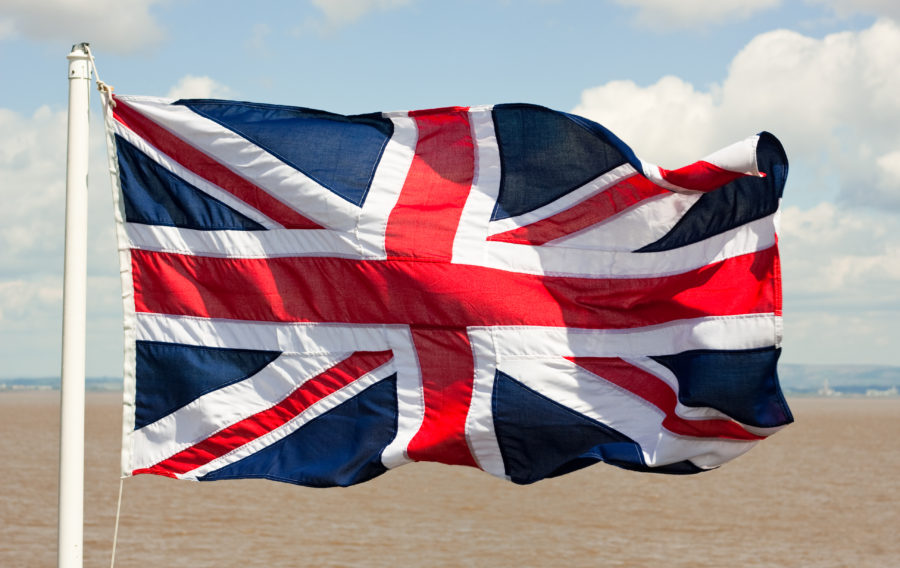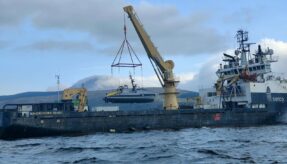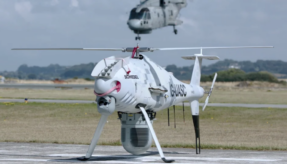
In our second article featuring SMEs in the defence arena, we speak to Jo Ashburner Farr, CEO and Operations Director of Red Dragon Flagmakers in Swansea.
With an interesting career spanning the design, manufacture, retail and wholesale of her own brand of eco baby products through to flag making via business development in leadership and management for academia and achieving a first class honours in design as a mature student as a single mum, Jo is now an elected member of the Social Business Wales advisory group, a Role Model for Welsh Government, a small business mentor, Wardroom member of the British Warships Association (HMS Dragon) and a passionate supporter of the social enterprise and BCORP movements.
Her life has taken her worldwide and most recently brought her back to Wales to work on what was originally the business set up by her father in 1969 when he was asked to make the flags for the investiture of the Prince of Wales at Caernarfon Castle.

Jo reinvented the 45 year old flag manufacturing business in 2011 when she scored the contract to supply traditional sewn quality flags for retail to the John Lewis Partnership for the Olympics and Jubilee year. In 2014, Red Dragon Flagmakers was launched officially as an incorporated social profit enterprise and the same year appointed as Official Supplier of flags to the NATO Summit. Two years and numerous client projects later, the company won the contract to supply flags to the European Space Agency in 2016.
Although Red Dragon Flagmakers produces 100% UK made traditional sewn and quality printed flags and banners for the Welsh Government, the Vatican, the BBC and Hollywood film-makers, it is perhaps surprising to note that the thriving business does not supply their world class products to the MOD.
We asked Jo why this is the case and for her thoughts on how the MOD could increase its SME spend.
You have a varied and successful career – winning UK National Businesswoman of the Year in 2006 and running an award-winning company – why flags?
Seeing first hand how manufacturing in South Wales has fallen on its knees has been a key motivator for me as a Neath and Valley girl. When my Father retired in 2008 I saw opportunity in what he had built up – manufacturing quality products and supporting skills and jobs for life – and although the business experienced a glitch between when he retired and when I reinvented what he’d started – I made a conscious decision to try and turn the tide.
I see flags as a bit like velcro, they’re not a super sexy or overly mainstream object …. but where would we be without them? I didn’t set out to make flags, in fact I avoided joining the family business so much so that I went abroad, but I suppose it was inevitable really and now I wouldn’t do anything else.
Life experience and a degree from UWTSD in design has enabled me to see beyond the obvious and no two days are the same in the workshop for me and my team.

Flags are everywhere. Seems obvious but now that I’ve said it, and no doubt you’ll start noticing that they’re everywhere. Every day flags are shown on the TV or used for historical purposes, they are flown at festivals, over castles or schools, by councils and businesses, by someone somewhere wanting to shout out about what they do, who they are and what they stand for. And that goes for our armed forces too.
We make a lot of fully sewn regimental flags and banners, either for barracks, ceremonial use or for funerals. I personally helped redesign the flag for the Royal Marines in Cardiff and am currently working on the revised Welsh Government Fisheries flag. I’ve recently responded to a direct request from the Canadian navy to quote for the supply of flags to their fleet – they say they want ‘the real thing’, not flags made digitally and for two years running we have made multiple sets of fully sewn traditional signal and code flags (41x 2 yarders per set) for an Icelandic fishing fleet. We make flags for merchant shipping, ceremonial flags for UK charities and a university in Saudi Arabia. But …. Here’s the thing, we have been unable to get direct contact or contracts from the British Ministry of Defence.
What problems have you experienced in tendering for MOD contracts?
The problem we see is that flags are generally bundled up in huge tenders with clothing, which are then contracted out to bigger firms with more experience perhaps in the clothing side of things than the flag element of the tender and so the flag element gets sub contracted out to other suppliers with a price increment at every stage.
Flags are an important part of the military tradition and should ideally be allocated a standalone section. As it stands at the moment, the MOD and therefore public money is being spent on too many middle men when all that needs to happen is for the specialists to be contacted and contracted directly. Pretty straight forward really.
One of the main reasons this isn’t happening, in my view, is that when a tender is written, the person writing the spec gives too many non-specifics – based perhaps on historical requirements rather than current best practice (fabrics, certifications etc) – these generalised specifications mean that the person filling in the purchase form doesn’t really know what they are asking for and so much is lost in translation. By the time the tender goes live and flags as a requirement are bundled together as we’ve said with clothing, the actual MOD requirement and best case scenario is lost.
Granted there are codes and regulations in place to help ensure that public money isn’t being wasted, but the procurement side needs to understand what it is asking for and when asking for flags it would be a good idea to ask the experts who make them every day. In the UK. And have done for years.
My father has the most incredible library of military, civilian and heraldic books – probably one of the finest and most comprehensive in private hands and we are able to deliver with precision and authority when consulted on vexillogical matters on a regular basis. We have all the information, we have the experience, the credibility, the authority, but we don’t have the access to the purchasing decision makers.

Made in the UK – the new black….?. The manufacturing and textile goods manufacturing industries in the UK specifically have been decimated in the last 30 years as buyers have looked to the Far East for cheaper goods. So often if you’re prepared to pay less then you should be prepared to buy more often and get less long term value.
This was happening so much in the US that the Senate passed a law a few years back declaring that all flags flown over public and military buildings in the USA and on US soil must now, by law, be made in the US.
There were 25,000 jobs in Wales alone making textile goods for the likes of M&S, Dewhurst and Gossard back in the day but now there are no more than 1,200 sewing jobs battling to survive against a backdrop of cheaper prices from India, the Far East and Eastern Europe. Did you know for example that our British Army uniforms are made in India….? We should be doing the same in the UK and consider having our forces uniforms made here too – if not all then at least a fair proportion.
How do you think this will change, bearing in mind the drive for public spend to engage and do more business with SMEs?
Firstly, it is fundamentally important to consider social outcomes as well as pricing when spending public money on anything including in this instance, public defence.
Enter the new breed of businesses, the social enterprise. Red Dragon Flagmakers is the first and only registered bona fide social enterprise Flagmaker in the UK and worldwide.
Secondly from a procurement perspective, Red Dragon Flagmakers falls into the SME category which I feel somewhat unfairly includes businesses with anything up to 250 employees. I don’t think that categorisation is relevant to the majority of actual small medium enterprises in the UK. Independent businesses don’t generally have those numbers of employees –and if they do they’re more likely to be part of a large multinational or bigger supply chain. Employing more than than 25 people in a business, let alone a manufacturing business, indicates you are a substantial business.

Thirdly and from the perspective of buying flags for our defence forces at least, there should be more emphasis on buying British first, a concerted effort to keep public money in the circular UK economy. We must nurture and keep skills alive – it can’t all be about IT and digital, it can’t be all about technology – you can’t wear technology, you can’t eat technology – let’s focus on manual productive skills before they die out and take what little is left of our industrial heritage with them. It’s nothing to do with politics or Brexit, its everything to do with retaining skills and industry to build a stronger country and community – and by the way isn’t that what the defence ministry is there to protect?
What is the social enterprise element of your business?
Making use of the traditional skills, almost reverently, that my father had developed with his own team over many many years of trial and error gave me the platform to launch the business in a social enterprise format.
The Public Services (Social Value) Act came into force on 31 January 2013 requiring that people who commission public services are obliged to think about how they can also secure wider social, economic and environmental benefits via their spend. Before starting the procurement process, commissioners are advised to think about whether the services they are going to buy, or the way they are going to buy them, could secure these benefits for their area or stakeholders. The Act is a tool to help commissioners get more value for money out of procurement. It also encourages commissioners to talk to their local provider market or community to design better services, often finding new and innovative solutions to difficult problems.
We’ve trained and rehabilitated 84 people in the past three years, we employ eight staff and we work closely with charities, agencies and business bodies to give access and the opportunities available to as many people previously marginalised from mainstream employment as possible. We train, rehabilitate and employ ex-forces personnel, people who have done time, those who due to personal circumstances have no education, no home, no safety, no future….. and we do all this while we manufacture, diversify, market and sell our products and continually meet our embedded social mission and expectations. We are 100% reliant on sales of our products and are not grant dependent. We are in fact a proper grown up viable and thriving business.

What do you see as the issues with getting access to the MOD and their procurement spend?
I’ve highlighted the need for a breakdown of actual product and expertise per tender but that will inevitably take a long time to analyse, engineer or react to as is the way with public sector lead times, so meanwhile, this business will make world class products and the public sector and MOD will continue to spend more public money than is needed on a product that in the end, will have less value and worth to the people it is serving.
What would you suggest?
As I’ve said, splitting bids would make it more accessible to SMEs around the UK.
The principle of publishing and making tenders online is very good, but more thought needs to be given to what is being asked for.
Smaller tranches will mean that more businesses will be able to get involved. We wouldn’t bid for a million pound plus contract as it currently stands purely because we’re too busy with our other clients who pay up front on a short turnaround, but we would team up with other businesses as a cooperative and collaborate on delivering a high spec, excellent quality product with ‘can do’ local and accessible customer service if the opportunity was given to us.
We don’t rely on MOD contracts to survive as a business – it would be fool hardy to put all your chances in one pot, not just from the MOD but from any one source of revenue. Just as well I hear you say, but wouldn’t it be a great boost to our UK business and to small UK businesses in general if we were given a look in on the opportunities available?

The alternative would be a real social outcome focus on the spend.
I would challenge the MOD to consider this business when tendering for their next multi-million pound contract for flags specifically. In return we would guarantee fair and considered terms and do what we’re already doing to a larger scale, training up and employing more people with the skills needed to make the traditional sewn flags required.
You couldn’t buy that kind of goodwill.
If you would like to join our community and read more articles like this then please click here








